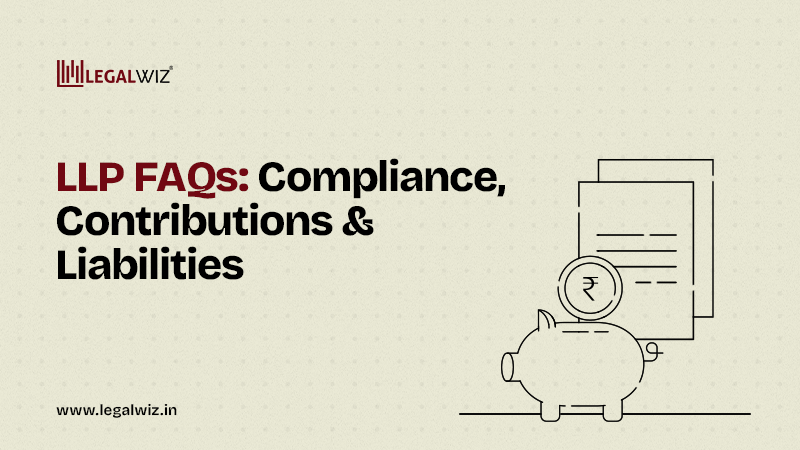LLP FAQs: Compliance, Contributions & Liabilities
If you’ve already gone through Part 1 LLP FAQs: Structure, Benefits & Legal Basics, of our FAQ series, you know what an LLP is and why it’s such a solid choice for modern businesses. In Part 2, LLP FAQs: Partners, Designated Roles & Registration, we broke down partner roles, registration requirements, and what makes a designated partner so important.
Here’s the thing: LLP registration is just step one. From partner contributions, exits to annual filings and regulatory disclosures, maintaining your LLP is a really long game.
If you’re unsure what to do after registration, this guide is for you.
What happens after your LLP is up and running? How do contributions work? What if a partner leaves or changes their details? Are you required to file every year, even if there’s no revenue? And how much protection does “limited liability” actually give you?
This third part of our FAQ series answers all those questions and a few more you didn’t know you needed to ask. If you’re building, scaling, or managing an LLP, this is your rulebook for staying compliant, clear, and in control.
Let’s get into it.
Q1. How can a person become a partner in an LLP?
A person can become a partner by joining as per the terms of the LLP Agreement. The LLP must file Form 4 with the Registrar of Companies (ROC) within 30 days of appointment. Designated Partners will also need a valid DPIN and Digital Signature Certificate (DSC).
Q2. How does an existing partner exit an LLP?
A partner can leave an LLP voluntarily through the terms in the LLP Agreement or with consent from other partners. The LLP must report this change to the ROC using Form 4. Once exited, the partner is no longer liable for the LLP’s future obligations.
Q3. What if a partner changes their name or address?
If a partner changes their name or residential address, it must be updated in Form 4 and submitted to the ROC within 30 days. Keeping records up to date is a legal requirement and helps avoid compliance issues later.
Q4. How can a partner contribute to an LLP, and how is it recorded?
Partners can contribute capital in cash, property, services, or even expertise. These must be recorded in the LLP Agreement, and a fair valuation assigned. Contributions form the basis for profit-sharing and liability limits.
Q5. Can a partner lend money to or transact with the LLP?
Yes, a partner can lend money or engage in business transactions with the LLP, provided these dealings are disclosed and documented. They should be at arm’s length to avoid conflicts of interest.
Q6. Can a partner transfer their economic rights in the LLP?
A partner may transfer their right to share in profits and losses, but this doesn’t give the transferee any say in LLP management. For full control, the new person must be admitted formally as a partner via Form 4.
Q7. What is the extent of a partner’s liability?
Each partner’s liability is limited to their agreed contribution. Personal assets are protected unless there’s fraud, wrongful acts, or intentional misconduct. That’s what makes LLPs attractive, a structure without personal financial risk.
Q8. What if the number of partners drops below two?
An LLP must always have at least two partners. If the number falls below that for more than six months, the remaining partner may become personally liable for all business obligations during that time. The ROC may even strike off the LLP.
Q9. Is a ‘partner by holding out’ liable under the LLP Act?
Yes. If someone represents themselves (or is knowingly represented) as a partner, even if they aren’t formally appointed, they may be held liable for obligations incurred under that representation. Be careful with public claims and signatures.
Q10. How is action taken against non-resident partners?
Non-resident partners are not exempt from compliance. If they violate the LLP Act or fail to meet obligations, they can face penalties and legal action under Indian law, including prosecution through Indian courts.
Q11. Is audit mandatory for all LLPs?
No. An LLP only needs to get its books audited if:
- Annual turnover exceeds ₹40 lakh, or
- Capital contribution exceeds ₹25 lakh
Below that threshold? Audit is optional, but maintaining accurate books is still a smart move.
Q12. What annual filings must an LLP submit?
All LLPs must file two key forms every year, even if there’s no business activity:
- Form 11 – Annual Return (due within 60 days from the end of the financial year)
- Form 8 – Statement of Account and Solvency (due within 30 days after 6 months from year-end)
Late filing attracts ₹100 per day per form with no cap, so don’t skip it.
Explore: LLP Annual Compliance Guide
Q13. What documents are available to the public?
Anyone can view your LLP’s public filings (like Form 11, Form 8, incorporation forms, and amendments) through the MCA portal by paying a nominal fee. This improves transparency and builds business credibility.
Q14. Can the Registrar ask for any further information?
Yes. The Registrar of Companies can ask for records and inspect filings, and inquiries can be initiated in case non-compliance is suspected. If the LLP refuses to cooperate, penalties can be imposed or legal action may be initiated against it, including winding up of the LLP.
Q15. Are LLPs required to have insurance?
There’s no mandatory insurance under the LLP Act. But depending on your business, it’s smart to consider professional indemnity or liability insurance — especially if you’re in consulting, tech, or advisory sectors.
Conclusion
While winding up, we can say an LLP isn’t a one-and-done registration. It comes with a lot of responsibilities, rights, and legal obligations. LLPs call for policies and strategies: capital contributions, annual returns, liability rules, exits of partners, and so on. But it is worth it. Because an LLP, when run in the right way, grants you flexibility to do your work while standing for you and the project, minus the headaches of running a full-fledged company.
Want to keep your LLP compliant throughout the year?
LegalWiz.in assists you throughout the LLP lifecycle-from LLP registration to annual compliance to partner changes-so you can now focus on your business instead of any bureaucracy.

Amisha Shah
Amisha Shah heads content at LegalWiz.in, where she transforms complex legal concepts into clear, actionable insights. With extensive experience in legal, fintech, and business services, she helps startups and enterprises navigate regulatory challenges through engaging, accurate content that empowers informed business decisions.







